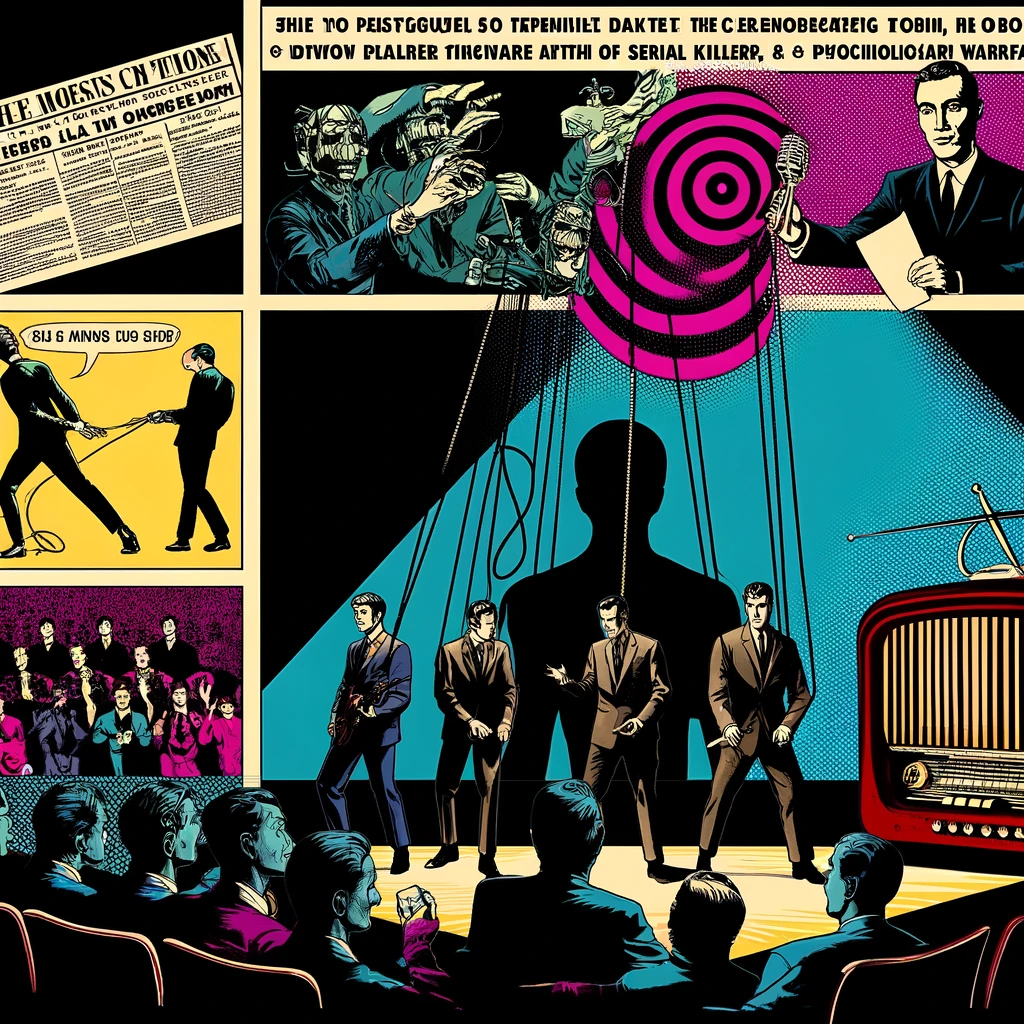Dave McGowan on Music Serial Killers and Psychological Warfare
https://odysee.com/$/search?q=dave%20mcgowan
Dave McGowan’s work delves into the intricate connections between the music industry, serial killers, and psychological warfare, suggesting that these elements are intertwined in ways that have significantly influenced American culture.
Music Industry and Military Connections
McGowan’s research highlights the surprising familial ties between prominent musicians of the 1960s and 1970s and military or intelligence backgrounds. For instance, Stewart Copeland, drummer for The Police, is the son of Miles Copeland Jr., a founding member of the OSS and later a CIA operative. McGowan posits that such connections may have facilitated the music industry’s role in social engineering, using music as a tool for mass influence and control.
Serial Killers and Psychological Operations
McGowan explores the possibility that certain high-profile serial killers were part of psychological operations aimed at instilling fear and compliance within the populace. He suggests that the media’s portrayal of these individuals may have been manipulated to serve broader agendas of social control.
Psychological Warfare through Music
The concept of using music as a means of psychological influence is further examined in discussions about tone and resonance as methods of social control. Certain musical scales and frequencies can evoke specific emotional responses, potentially influencing behavior and societal norms. This aligns with McGowan’s assertions that the music industry has been utilized to shape public consciousness, often in ways that serve covert objectives.
Critical Reception and Controversy
McGowan’s theories have sparked debate, with critics questioning the validity of his connections and interpretations. Skeptics argue that correlations between musicians and military backgrounds may be coincidental rather than indicative of a deliberate agenda. Nonetheless, McGowan’s work encourages a critical examination of the entertainment industry’s potential role in societal manipulation.
Conclusion
Dave McGowan’s investigations into the intersections of the music industry, serial killers, and psychological warfare offer a provocative perspective on the potential for cultural manipulation through entertainment and media. While his conclusions are contentious, they prompt important discussions about the influence of popular culture on societal beliefs and behaviors.

Dave McGowan on Music Serial Killers and Psychological Warfare 2024
Exploring Dave McGowan’s “Programmed to Kill” and “Inside the LC”
Dave McGowan’s works, Programmed to Kill: The Politics of Serial Murder and Inside the LC: The Strange but Mostly True Story of Laurel Canyon and the Birth of the Hippie Generation, dive deep into the unsettling intersections of crime, culture, and covert operations. With a style that challenges mainstream narratives, McGowan questions conventional understandings of serial killers, the countercultural revolution, and the music industry’s golden age.
Programmed to Kill: Serial Murder as Psychological Warfare
In Programmed to Kill, McGowan asserts that the traditional portrayal of serial killers as lone, deranged individuals often obscures deeper truths. He explores connections between high-profile serial killers and covert psychological operations, suggesting that many of these crimes may have been manipulated or facilitated as part of broader social experiments.
Key themes in the book include:
- Military and Intelligence Ties: McGowan identifies military and intelligence connections in the backgrounds of certain killers, highlighting anomalies that challenge accepted narratives.
- Media Manipulation: The book discusses how the media sensationalizes these cases, creating fear and compliance in the public. McGowan posits that these narratives serve as tools for psychological warfare.
- Ritualistic and Occult Symbolism: He delves into the occult and ritualistic aspects of some murders, hinting at deeper, orchestrated motives that intertwine with societal elites.
By framing serial murder within the context of political and social control, McGowan pushes readers to question the real motives and origins behind some of history’s most infamous cases.
Inside the LC: Laurel Canyon and the Countercultural Revolution
McGowan’s Inside the LC focuses on the peculiar origins of the 1960s counterculture movement, which was deeply rooted in Laurel Canyon, a small neighborhood in Los Angeles. What makes McGowan’s exploration unique is his attention to the military and intelligence backgrounds of many iconic artists from this era.
Key revelations include:
- Military Lineages of Counterculture Icons: Many prominent musicians, such as Jim Morrison of The Doors, hailed from families with ties to military and intelligence agencies. Morrison’s father, for example, was a key figure in the Gulf of Tonkin incident, a pivotal moment in escalating the Vietnam War.
- Controlled Opposition: McGowan raises the possibility that the counterculture movement, while seemingly revolutionary, may have been manipulated to distract or pacify the growing unrest of the 1960s youth.
- Drug Culture and Its Implications: The book examines how the burgeoning drug culture in Laurel Canyon may have been influenced by covert operations to undermine legitimate social movements.
Shared Themes and McGowan’s Legacy
Both Programmed to Kill and Inside the LC weave a narrative that challenges the boundaries of accepted history. McGowan’s meticulous research and willingness to question mainstream narratives invite readers to rethink the stories we take for granted about crime, culture, and politics.
While critics often label McGowan’s work as speculative, his research raises compelling questions about the hidden mechanisms of power and control in modern society. These books are not just investigations into dark corners of history but invitations to scrutinize the forces shaping our reality. For readers who value critical thinking and alternative perspectives, McGowan’s works remain essential and provocative reads.